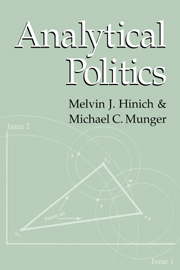Section III - Recent advances
Published online by Cambridge University Press: 05 June 2012
Summary
In the first section of this book we presented the classical model of analytical politics. The main result deriving from this model is the median voter theorem (MVT) in a single dimension. The MVT was then generalized to multiple dimensions. We next considered the basics of social choice and alternative voting systems. An important aspect of this inquiry was the attempt to identify the circumstances under which collective choices are coherent and normatively defensible as reflecting the will of the people. In the second section, we considered some extensions to the basic results, including accounting for voter uncertainty, candidate character, and the preferences that candidates themselves may have over policy outcomes. Finally, the basic model was extended to account for abstention, or withholding one's vote out of indifference or alienation. We concluded that while these are important marginal effects, the basic act of voting may have more to do with consumption than investment.
With the exception of the turnout decision, the model we have covered so far has mostly focused on committee voting, instead of mass elections. This model is useful as a starting point to analyze politics. Now we are going to consider some difficult problems that confront social scientists who wish to use the analytical model to understand real-wo rid policy decisions. In Chapter 8, we focus on problems with the classical model of committee voting. In Chapter 9, we examine the model's applicability to mass elections.
- Type
- Chapter
- Information
- Analytical Politics , pp. 155 - 156Publisher: Cambridge University PressPrint publication year: 1997

